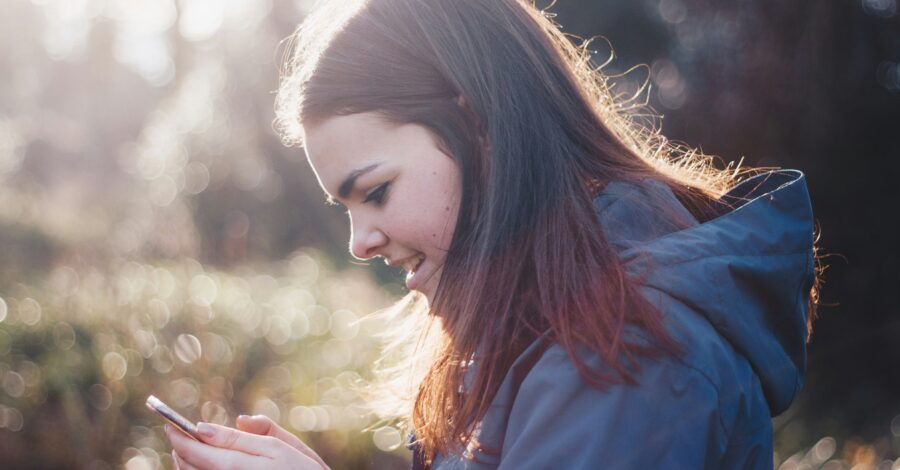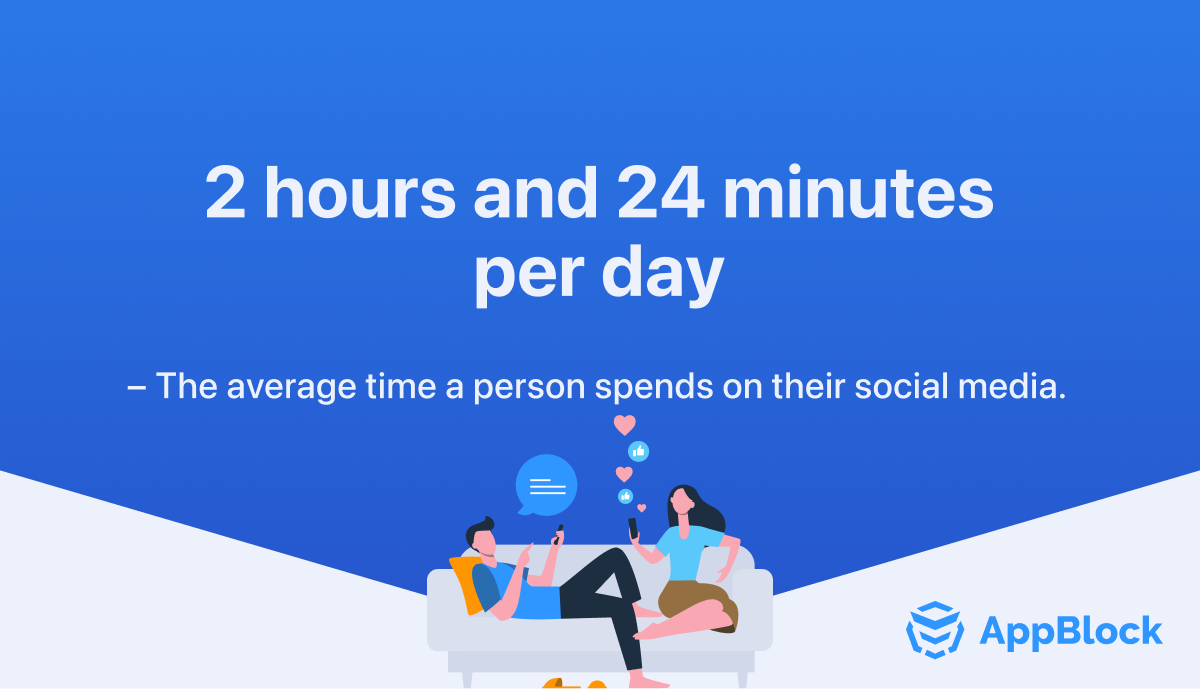• Well-being •8 min read

Think – constantly reaching for your phone, coming back to check for likes, scrolling and losing the sense of time. Sounds familiar? Social media is a great space for sharing what’s important for us. That’s why 72 % of adults and 84 % of teens use social media in the US [1].
We go there for fun, social interactions, and even for information. But social media can get tricky. While having phones constantly in our back pockets, it’s easy to lose control of the content we consume and how often we consume it. That’s where a Phone addiction app like AppBlock can help you regain balance and take back control of your attention.
The term social media addiction is rising in popularity as people are becoming more aware of the negative effects of social media on mental health. What exactly is a social media addiction?
Social media addiction is defined as a compulsive engagement in social media platforms that significantly disrupt users’ functioning in crucial life areas, including interpersonal relationships, work or study performance, and physical health [2].
It is important to note that approximately 5 – 10% of Americans are addicted to social media [3]. So spending a vast amount of time on social media doesn’t necessarily mean you are addicted. Let’s break this definition down into seven types of problematic behavior associated with social media addiction.
The average time a person spends on their social media is 2 hours and 24 minutes per day (globally). What is the proportion of social media in your screen time? Another possible guideline here is – do you need to spend more and more time on social media in order to feel the same level of satisfaction after using it [2,4]?

Do you catch yourself thinking about social media often when you aren’t using it? Do you often wish you would be on social media instead of doing some particular activity? These are other signs to watch out for [2,4].
In this case, you use social media to distract yourself or to mitigate your negative emotions. In other words, it works as your escape. Do you often use social media as a distraction when feeling bad [2,4]?
Did you try to cut down on social media and it didn’t really work? You might have found yourself trying to decrease the time spent on socials but you keep coming back and can’t help it [2,4].
Perhaps you tried to cut down on socials or appeared without your phone for some time. Did you experience uncomfortable emotions like anxiety and irritability? If so, it can be a sign of social media addiction [2,4].
This doesn’t have to mean that using socials in your class instead of paying attention makes you addicted. What we want to watch out here for is the effect your social media use has over time. Perhaps you are experiencing a huge productivity decrease or negative results. Is it linked to your social media use [2,4]?
Do you see yourself spending less time with other people in order to use social media? If you cancel your plans and end up on socials once in a while, it doesn’t necessarily indicate addiction. What you should watch out for is how frequently it happens and how it affects your relationships [2,4].
One of the main reasons we like it so much is the dopamine hit we get after scrolling (fill in your favorite social). Dopamine is the “feel good” chemical released in our brain when we experience pleasure – eating a good meal, having sex or catching up with friends. Social media presents us with an always available dopamine hit. Hard to resist, right [4,5]?
Yes, this is where likes come into play. We want to feel like we belong. So it’s natural for us to strive for likes and positive feedback on our posts. This can reinforce our sense of belonging and is one of the reasons why we keep coming back for more [4,5]. The danger comes when we start comparing ourselves to other people based on how “liked” we are on social media. This can have a negative effect on mental health.
Fear of missing out is real even on social media. We don’t want to miss out on what our friends are up to or what is the latest viral joke going around [4,5].
Social media is a vast space. We are able to find people with so many different lifestyles, ideas and ways to express themselves. This gives us a chance to find very niche and unique identities as well as create them for ourselves [4,5].
“No mobile phone phobia” is an anxiety around not having your phone with you at all times. That itself opens a door for another discussion. How dependent, perhaps addicted are we on our phones vs on social media [4,5]?
Social media addiction is not an official diagnosis yet. Many researchers do recognize addictive aspects of social media and have developed measures for recognizing it, some of which are mentioned above.
The addiction is not directly linked to the hours we spend using socials. What is more relevant is how it affects our lives. Another guideline researchers have observed is the engagement level. They identified mindless scrolling and link jumping as riskier in developing addiction than posting and sharing photos and videos.
With that being said – many of us have serious social media habits that can be considered unhealthy and have negative effects on our mental health. That itself does not indicate addiction. However, whether we are experiencing addiction or not, any negative impact on our lives should be taken seriously [6].
If you think you might be dealing with a social media addiction, therapy offers several proven methods for treating addictions. Therapists provide professional support while guiding you through your recovery process into a social media addiction-free life. Consult a therapist to find an approach that works for you.
Struggling to cut down on social media? AppBlock can help. This handy app lets you block distracting social media apps at specific times, like during work or study hours. With features like Strict Mode, which prevents changes to your blocking settings, and detailed usage statistics, AppBlock empowers you to take control of your screen time.
You can also set Usage Limits, allowing you to allocate a specific number of minutes for social media each day and gradually reduce it over time.
Start using AppBlock to support your new digital habits and achieve a healthier balance in your life.
Download here for iOS and Android.
There are many ways social media can be harmful to your mental health, whether a social media addiction or not. If you are struggling, know that you are not alone and that there are options for treatment.
In need of help, call the NAMI HelpLine.
Sources:
[1] https://backlinko.com/social-media-users#social-media-usage-statistics-top-picks¨
[2] https://www.ncbi.nlm.nih.gov/pmc/articles/PMC8787656/
[3] https://www.addictioncenter.com/drugs/social-media-addiction/
[4] https://www.goodrx.com/well-being/behavioral-addiction/addicted-to-social-media
[5] https://www.mcleanhospital.org/essential/it-or-not-social-medias-affecting-your-mental-health
[6] https://psychnews.psychiatryonline.org/doi/10.1176/appi.pn.2024.04.4.5
Gain back control over your screen, empower your life with AppBlock.
Try for free